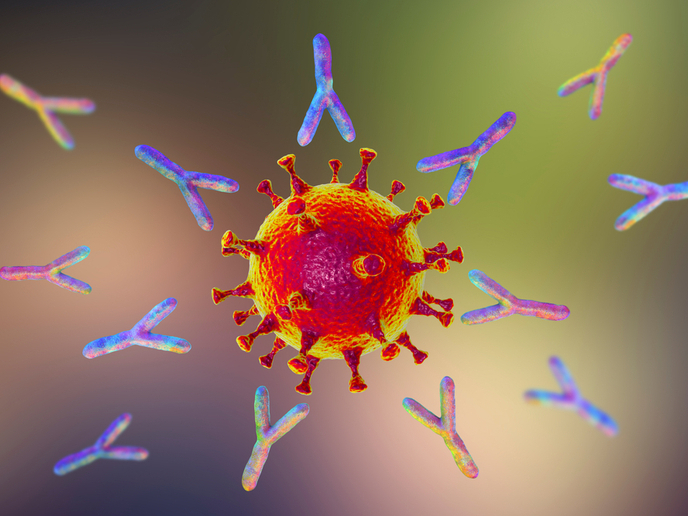Protection against SARS-CoV-2 and variants with double antibody
An international team of researchers has developed a double antibody that protects against SARS-CoV-2 and its variants. Even better, it stops the virus from mutating to resist antibiotics and other medicines. With support from the EU-funded ATAC project, the researchers found the antibody effective in neutralising SARS-CoV-2 and its variants in mice and in preventing the virus from evading antibodies. Their findings have been published in the journal ‘Nature’.
Double attack on the virus
Although otherwise effective against COVID-19, antibody-based immunotherapy still needs to tackle the problem of the multiple variants already circulating around the globe and the potential formation of new variants. To solve this problem, the scientists joined two natural antibodies to create an artificial molecule called a bispecific antibody that has the ability to simultaneously bind two independent sites on the virus. “We exploited our knowledge of the molecular structure and biochemical traits of the virus to fuse together two human antibodies, obtaining a single bispecific molecule simultaneously attacking the virus in two independent sites critical for infectivity,” stated study co-author Luca Varani of ATAC project partner Institute for Research in Biomedicine (IRB), Switzerland, in a press release posted on the IRB website. “Supercomputing simulations allowed us to refine and validate the bispecific antibody design, which was later produced and tested in the laboratory. Although the virus can mutate and escape from the attack of a single first-generation antibody, we have shown that it cannot do so against the double action of the bispecific.”
Instantaneous protection against COVID-19
In the preclinical trials, the antibody neutralised SARS-CoV-2 and variants such as the recent United Kingdom variant spreading across Switzerland and Europe. A single injection was all that was needed to provide mice with immediate protection against the disease. “The antibody effectively reduces viral burden in the lungs and mitigates inflammation typical of COVID-19,” explained co-author Daniel Ruzek of the Biology Centre of the Czech Academy of Sciences in the same press release. Since SARS-CoV-2 will continue to mutate, the world needs treatments that will be effective on all variants of the coronavirus. “This antibody means we can stay one step ahead of the virus,” observed co-author Qiang Pan-Hammarström of project coordinator Karolinska Institutet, Sweden, in an article posted on the medical university’s website. The antibody developed as part of the ATAC (Antibody therapy against coronavirus (COVID-19)) project is the first human bispecific antibody created against the SARS-CoV-2 virus. “The fact that some people will not respond to vaccines and that it might take several years for the whole world to be vaccinated against COVID-19, means there will be an ongoing need for medicines that can protect us from or treat the disease,” concluded Pan-Hammarström. For more information, please see: ATAC project website
Keywords
ATAC, coronavirus, antibody, virus, bispecific, variant, SARS-CoV-2, COVID-19



